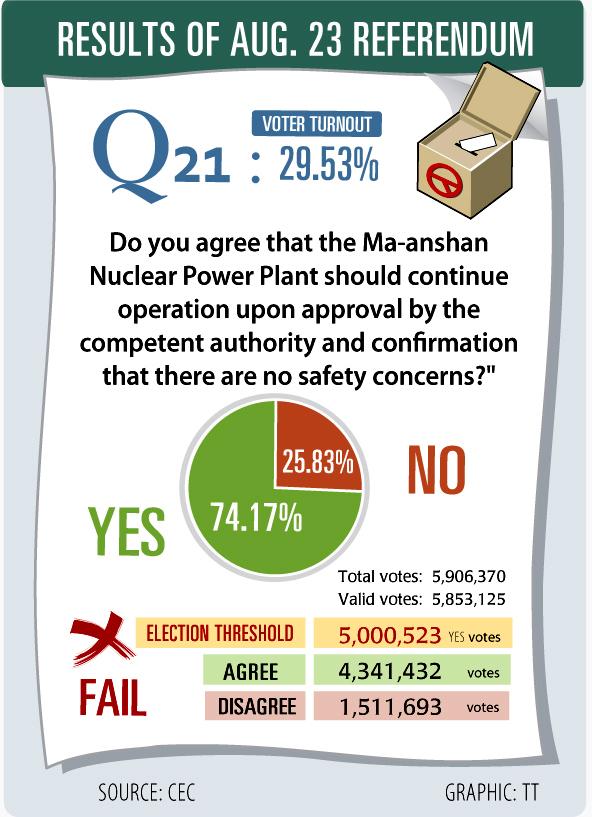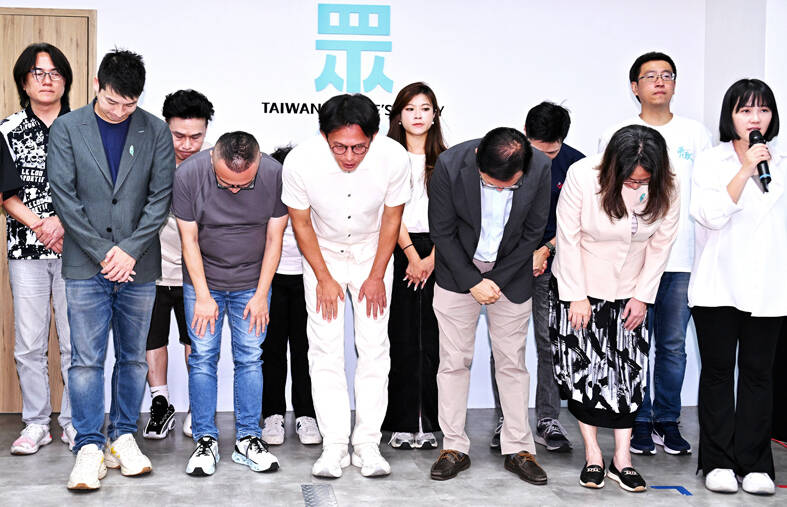The government does not rule out advanced nuclear energy generation if it meets the government’s three prerequisites, President William Lai (賴清德) said last night after the number of votes in favor of restarting a nuclear power plant outnumbered the “no” votes in a referendum yesterday.
The referendum failed to pass, despite getting more “yes” votes, as the Referendum Act (公民投票法) states that the vote would only pass if the votes in favor account for more than one-fourth of the total number of eligible voters and outnumber the opposing votes.
Yesterday’s referendum question was: “Do you agree that the Ma-anshan Nuclear Power Plant should continue operations upon approval by the competent authority and confirmation that there are no safety concerns?”

Photo: Tu Chien-jung, Taipei Times
More than 4.34 million people voted “yes” to the restarting of the power plant, while more than 1.51 million chose “no.” The voter turnout was 29.53 percent.
Lai said the government respects the referendum result and would continue to prioritize nuclear safety in its energy policy.
Lai added he understood "the society's expectations for diverse energy options."

"The greatest consensus of Taiwan's energy debate ... is safety. Nuclear safety is a scientific issue, and one that cannot be resolved through a single vote," he said.
Restarting nuclear plants could not be considered without the Nuclear Safety Council establishing rules for nuclear safety review and Taiwan Power Co (Taipower, 台電) conducting a safety review in accordance with the rules, he said.
Lai said he asked the council to propose nuclear safety review rules for Taipower to conduct safety inspections on its nuclear power generating units.

Photo: Fang Pin-chao, Taipei Times
The council should formulate the rules as soon as possible and Taipower should begin nuclear safety inspections after the rules are promulgated, Lai said, adding that information on the progress and potential risks would be disclosed to the public.
“If safety requirements are met, the proposal [of restarting nuclear plants] could next be sent to the council for review,” he said.
The government would continue to address nuclear issues based on three principles: nuclear safety, nuclear waste solutions and societal consensus, Lai said.
“If nuclear technology becomes safer, with less nuclear waste produced and greater social acceptance, we would not preclude such advanced nuclear technology,” he said, adding that the government was responsible for ensuring a stable power supply for the public.
Taiwan People’s Party Chairman Huang Kuo-chang (黃國昌), whose party proposed the referendum, at a separate news conference last night expressed thanks to the more than 4 million voters who voted “yes” to restarting the Ma-anshan power plant.
“That marked a new start point in the history of Taiwan’s energy transition and showed that the Democratic Progressive Party should review its wrong energy policy,” he said.
Although the “yes” votes did not reach the 25 percent threshold, the agreeing votes outnumbered the “no” votes nearly threefold, indicating that the government should step up the energy transition by correcting its energy policy, Huang said.
The Ministry of Economic Affairs should allow Taipower to apply for restarting nuclear power plants, based on Article 6 of the Nuclear Reactor Facilities Control Act (核子反應器設施管制法), he said.
“Yes” votes exceeded “no” votes even in Pingtung County, where the Ma-anshan power plant is located, showing that the locals are willing to restart the plant for a stable power supply, Huang added.
Chinese Nationalist Party (KMT) Chairman Eric Chu (朱立倫) yesterday said that the referendum result was a triumph for the public’s voice over the authorities’ arrogance.
He also called on the Lai administration to refrain from political infighting and prioritize people’s livelihoods.
Chu proposed five reform initiatives on behalf of the KMT — providing relief packages in response to increased US tariffs, bolstering energy security, enhancing judicial independence, respecting the legislature’s power of oversight and to stop tearing apart society.
Additional reporting by AFP

In his National Day Rally speech on Sunday, Singaporean Prime Minister Lawrence Wong (黃循財) quoted the Taiwanese song One Small Umbrella (一支小雨傘) to describe his nation’s situation. Wong’s use of such a song shows Singapore’s familiarity with Taiwan’s culture and is a perfect reflection of exchanges between the two nations, Representative to Singapore Tung Chen-yuan (童振源) said yesterday in a post on Facebook. Wong quoted the song, saying: “As the rain gets heavier, I will take care of you, and you,” in Mandarin, using it as a metaphor for Singaporeans coming together to face challenges. Other Singaporean politicians have also used Taiwanese songs

NORTHERN STRIKE: Taiwanese military personnel have been training ‘in strategic and tactical battle operations’ in Michigan, a former US diplomat said More than 500 Taiwanese troops participated in this year’s Northern Strike military exercise held at Lake Michigan by the US, a Pentagon-run news outlet reported yesterday. The Michigan National Guard-sponsored drill involved 7,500 military personnel from 36 nations and territories around the world, the Stars and Stripes said. This year’s edition of Northern Strike, which concluded on Sunday, simulated a war in the Indo-Pacific region in a departure from its traditional European focus, it said. The change indicated a greater shift in the US armed forces’ attention to a potential conflict in Asia, it added. Citing a briefing by a Michigan National Guard senior

CHIPMAKING INVESTMENT: J.W. Kuo told legislators that Department of Investment Review approval would be needed were Washington to seek a TSMC board seat Minister of Economic Affairs J.W. Kuo (郭智輝) yesterday said he received information about a possible US government investment in Taiwan Semiconductor Manufacturing Co (TSMC, 台積電) and an assessment of the possible effect on the firm requires further discussion. If the US were to invest in TSMC, the plan would need to be reviewed by the Department of Investment Review, Kuo told reporters ahead of a hearing of the legislature’s Economics Committee. Kuo’s remarks came after US Secretary of Commerce Howard Lutnick on Tuesday said that the US government is looking into the federal government taking equity stakes in computer chip manufacturers that

CLAMPING DOWN: At the preliminary stage on Jan. 1 next year, only core personnel of the military, the civil service and public schools would be subject to inspections Regular checks are to be conducted from next year to clamp down on military personnel, civil servants and public-school teachers with Chinese citizenship or Chinese household registration, the Mainland Affairs Council (MAC) said yesterday. Article 9-1 of the Act Governing Relations Between the People of the Taiwan Area and the Mainland Area (臺灣地區與大陸地區人民關係條例) stipulates that Taiwanese who obtain Chinese household registration or a Chinese passport would be deprived of their Taiwanese citizenship and lose their right to work in the military, public service or public schools, it said. To identify and prevent the illegal employment of holders of Chinese ID cards or